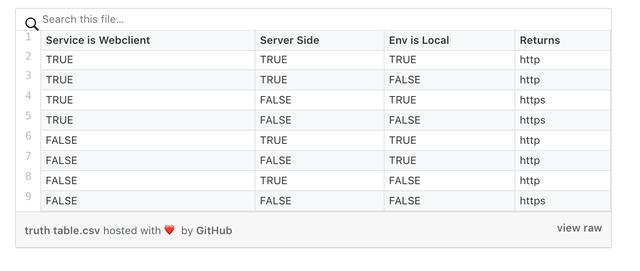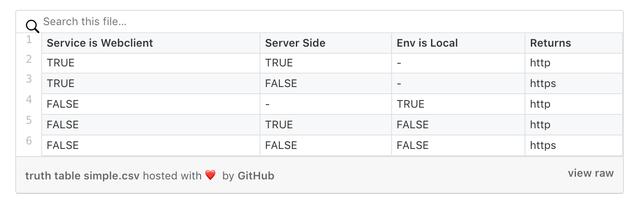最近,我不得不重构一些处于粗糙状态的代码:
- function endpoint(service, version = '') {
- let protocol
- let domain
- if (service === 'webclient') {
- protocol = __CLIENT_PROTOCOL__
- domain = `${__ENV__}-${service}.${__DOMAIN__}`
- if (__SERVER__) {
- protocol = 'http'
- } else if (__ENV__ === 'production') {
- domain = `www.${__DOMAIN__}`
- }
- } else {
- if (__ENV__ !== 'local') {
- if (__SERVER__) {
- protocol = 'http'
- domain = `${__ENV__}-${service}`
- domain += `.${__DOMAIN__}`
- } else {
- protocol = __CLIENT_PROTOCOL__
- domain = `${__ENV__}-api.${__DOMAIN__}`
- if (service !== 'core') {
- domain += `/${service}`
- }
- if (version) {
- domain += `/${version}`
- }
- }
- } else {
- protocol = 'http'
- if (service === 'core') {
- if (__CLIENT__) {
- domain = `api.${__DOMAIN__}`
- } else {
- domain = `api.${__DOMAIN__}:80`
- }
- } else {
- if (__CLIENT__) {
- domain = `api.${__DOMAIN__}/${service}/${version}`
- } else {
- domain = `api.${__DOMAIN__}:80/${service}/${version}`
- }
- }
- }
- }
- const url = `${protocol}://${domain}`
- return url
- }
- export default endpoint
上面的逻辑确定端点的URL,它取决于多种因素:您使用的服务,在服务器或客户端上呈现的服务,在生产环境或测试环境中使用的服务等。
一段代码变得如此混乱的原因之一是,当我们忘记重复比错误的抽象要便宜得多时。
好消息是,您可以应用几种简单的技术来简化嵌套的if-else语句。 坏消息是,这段代码对应用程序至关重要,因为所有请求都在调用它。 哦,它也没有经过测试!
所以,这就是我重构的方式…
1. 给该代码100%的测试覆盖率
我没有执行重构代码的任务,所以打电话了。 但是我不知道要花多少时间(我本该用来交付其他东西的时间)。
重构本身并不总是合理的。 但是,很难想象有人会抱怨增加测试范围,尤其是在涵盖如此关键的功能的情况下。 因此,我决定从此开始,不仅是为了让我对重构充满信心,而且因为当我完成测试时,我将更好地了解重构的难度,并且我可以进行/不进行。 去打电话。
如今,我们大多数人都在Gousto中实践TDD,但是代码库的这一特定部分是几年前的,它的重要性和状态阻碍了我和其他人在过去对其进行重构。
TDD的主要好处是无需担心,也无需花费成本即可进行重构-罗伯特·马丁(Robert C. Martin,鲍勃叔叔)
我还想确保覆盖率是100%,所以我使用了Jest标志–coverage,它提供了以下输出:
- -------------------|----------|----------|----------|----------|-------------------|
- File | % Stmts | % Branch | % Funcs | % Lines | Uncovered Line #s |
- -------------------|----------|----------|----------|----------|-------------------|
- ... | ... | ... | ... | ... | ...|
- endpoint.js | 100 | 100 | 100 | 100 | |
- ... | ... | ... | ... | ... | ...|
- -------------------|----------|----------|----------|----------|-------------------|
- Test Suites: 1 passed, 1 total
- Tests: 12 passed, 12 total
2. 提取功能
现在我们有了测试,有了更多的信心,我们可以开始拆分代码。 让我们从头开始。 我们看到,根据服务,环境,客户端/服务器端……为协议分配了不同的值,然后将其添加到函数末尾的其余url中。
- const url = `${protocol}://${domain}`
因此,我们可以将确定协议的代码抽象为自己的函数,只需调用一次即可:
- import endpoint from 'config/endpoint'
- describe('endpoint.js', () => {
- global.__DOMAIN__ = 'gousto.local'
- let service
- describe('when the service is "webclient"', () => {
- beforeEach(() => {
- service = 'webclient'
- })
- describe('and being in the server side', () => {
- beforeEach(() => {
- global.__SERVER__ = true
- global.__ENV__ = 'whateverenv'
- })
- test('an http address with the corresponding ENV, SERVICE and DOMAIN is returned', () => {
- const url = endpoint(service)
- expect(url).toBe(`http://${__ENV__}-${service}.${__DOMAIN__}`)
- })
- })
- describe('and not being in the server side', () => {
- ...
- describe('and the environment is production', () => {
- ...
- test('an https address with "www" and without the service, but with the DOMAIN is returned', () => {...})
- })
- describe('and the environment is not production', () => {
- ...
- test('an https address with the corresponding ENV, SERVICE and DOMAIN is returned', () => {...})
- })
- })
- })
- describe('when the service is not "webclient"', () => {
- ...
- describe('and the env is not "local"', () => {
- ...
- describe('and being in the server side', () => {
- ...
- test('an http address with the corresponding ENV, SERVICE and DOMAIN is returned', () => {...})
- })
- describe('and not being in the server side', () => {
- ...
- describe('and the service is core', () => {
- ...
- test('an https API address with the corresponding ENV and DOMAIN is returned', () => {...})
- describe('and a version was passed', () => {
- test('an https API address with the corresponding ENV, DOMAIN, SERVICE and VERSION is returned', () => {...})
- })
- })
- describe('and a version was passed', () => {
- test('an https API address with the corresponding ENV, DOMAIN, SERVICE and VERSION is returned', () => {...})
- })
- describe('and a version was not passed', () => {
- test('an https API address with the corresponding ENV, DOMAIN and SERVICE is returned', () => {...})
- })
- })
- })
- describe('and the env is "local"', () => {
- ...
- describe('and the service is core', () => {
- ...
- describe('and being in the client side', () => {
- ...
- test('an http API address with the corresponding DOMAIN is returned', () => {...})
- })
- describe('and not being in the client side', () => {
- ...
- test('an http API address with the corresponding DOMAIN and port 80 is returned', () => {...})
- })
- })
- describe('and the service is not core', () => {
- ...
- describe('and being in the client side', () => {
- ...
- test('an http API address with the corresponding DOMAIN, SERVICE and VERSION is returned', () => {...})
- })
- describe('and not being in the client side', () => {
- ...
- test('an http API address with the corresponding DOMAIN, port 80, SERVICE and VERSION is returned', () => {...})
- })
- })
- })
- })
- })
我们可以对URL的其余部分执行与getProtocol()相同的操作。 提取的功能越多,if-else的地狱就越容易简化,提取剩余的内容就越容易。 因此,我的建议是从最小的复杂度入手,因为这将使其余的操作更为简单。
提取这些函数并不复杂,但这是因为我将if-else的噩梦翻译成了它们。 因此,我们没有大的混乱,但有一些小混乱。 不能接受 让我们来照顾它。
3. 简化
除了关注点分离之外,将url的不同部分提取为不同功能的优点是可以进一步简化条件。 之前,URL的某些部分限制了简化,因为它们需要满足多个条件。 现在,它们是分开的,所以我们不必为此担心。
您可以只是出于对它的关注而进行简化……或者您可以使用真值表来提供帮助。
对于getProtocol(),一种真值表如下所示:
但可以简化一下("-"表示该值无关紧要):
我们只有两个可能的值:http和https,因此我们可以采用较少行(https)的值,检查条件,然后返回另一个(http)。
- const getProtocol = (service, isServerSide, environment) => {
- if (service === 'webclient' && !isServerSide) {
- return 'https'
- }
- if (service !== 'webclient' && !isServerSide && environment !== 'local') {
- return 'https'
- }
- return 'http'
- }
这已经比上一节中的要好。 但是我们仍然可以做更多! 检查前两个条件,您可能会发现只有在我们不在服务器端时才获得https。 因此,我们可以为http编写第一个条件,并在函数的其余部分中摆脱isServerSide:
- const getProtocol = (service, isServerSide, environment) => {
- if (isServerSide) {
- return 'http'
- }
- if (service === 'webclient') {
- return 'https'
- }
- if (service !== 'webclient' && environment !== 'local') {
- return 'https'
- }
- return 'http'
- }
不过,我们可以做得更好。 现在我们可以合并第二个和第三个条件,因为它们较小:
- const getProtocol = (service, isServerSide, environment) => {
- ...
- if (service === 'webclient' ||
- (service !== 'webclient' && environment !== 'local')) {
- return 'https'
- }
- ...
- }
但是,请保持……这种状况有点愚蠢,不是吗? 如果服务是webclient,则条件为true。 否则……转到OR的第二部分,为什么我们需要检查服务是否不是webclient? 如果我们在OR的右侧,那么我们确定它不是webclient。 最终结果看起来很整洁,特别是与第2部分中的原始结果相比。提取功能:
- const getProtocol = (service, isServerSide, environment) => {
- if (isServerSide) {
- return 'http'
- }
- if (service === 'webclient' || environment !== 'local') {
- return 'https'
- }
- return 'http'
- }
结果
多亏了功能的提取,我们最终有了一个endpoint()函数,这是我写的荣幸。
- ...
- function endpoint(service, version = '') {
- const protocol = getProtocol(service, __SERVER__, __ENV__)
- const subdomain = getSubdomain(service, __SERVER__, __ENV__)
- const path = getPath(service, __SERVER__, __ENV__, version)
- const port = getPort(service, __ENV__, __CLIENT__)
- return `${protocol}://${subdomain}.${__DOMAIN__}${port}${path}`
- }
- export default endpoint
上面代码的get函数很小,足以被理解而不会动您的大脑。 并非所有人都像我想要的那样简单,但是它们比原始代码要好得多。 您可以在这里看到文件的外观。
最后,您应该始终尝试遵循以下规则:让代码比发现的要好。 尽管赞美❤️不要这么做
> GitHub comment in the PR
> A team mate making my day
现在轮到您了,您是否有任何想法使它变得更简单(无需更改在其余应用程序中的使用方式)? 您对重构的处理方式会有所不同吗?






























